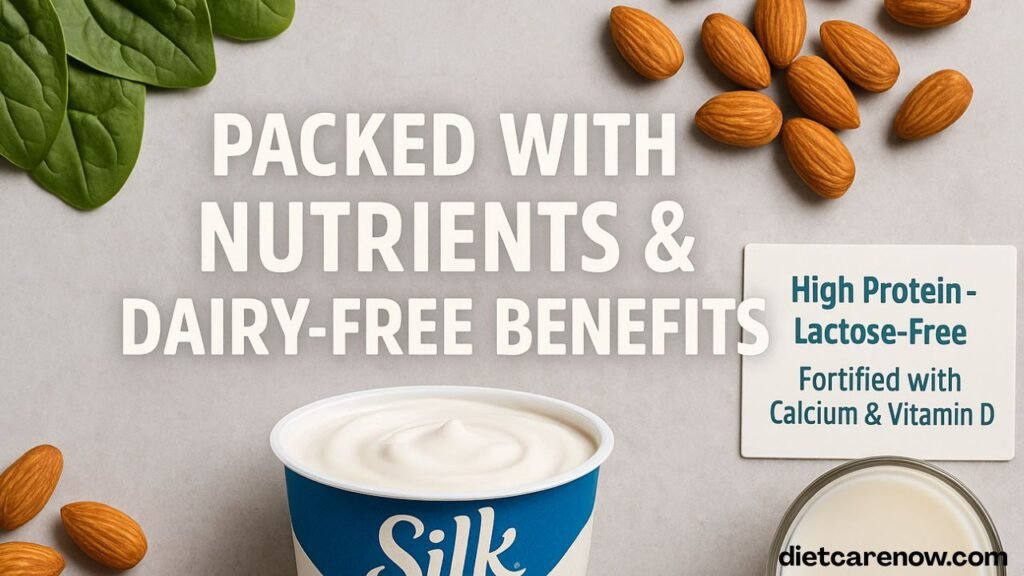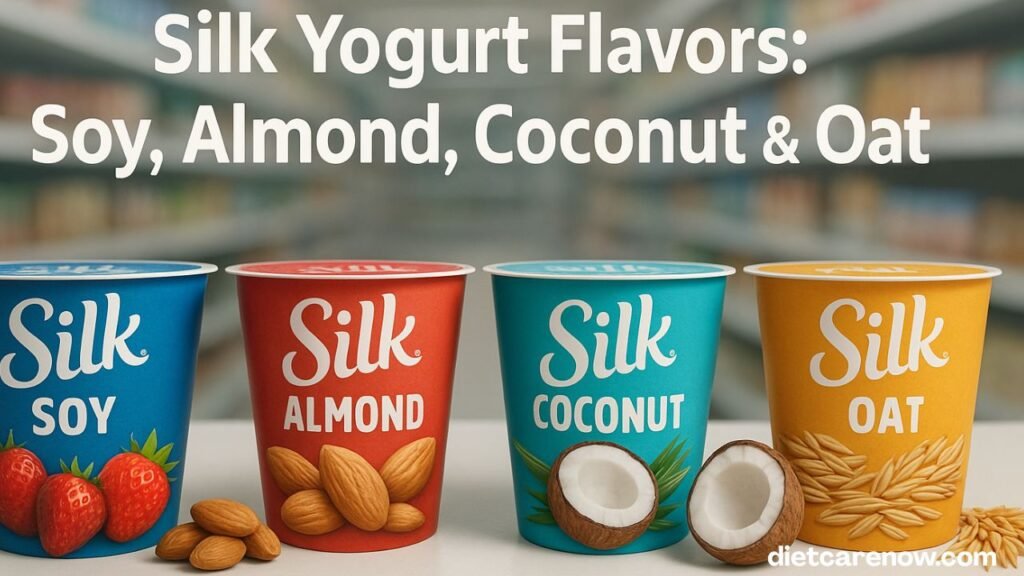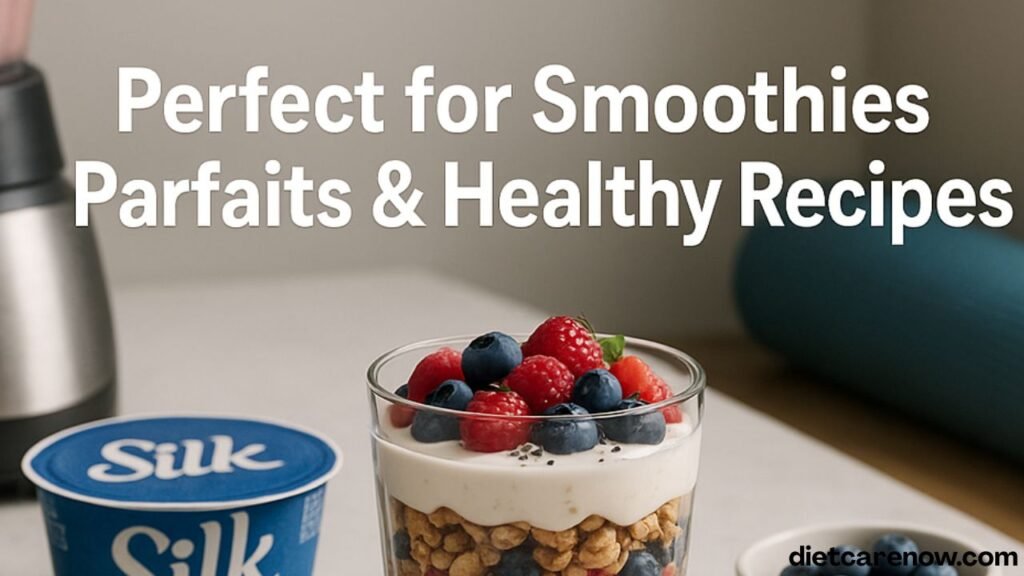Silk Yogurt has become a favorite among people who want a smooth, creamy snack without relying on dairy. Unlike traditional yogurt made from cow’s milk, Silk Yogurt is completely plant-based. It uses ingredients like soy, almonds, coconuts, or oats to create that same tangy taste and velvety texture we expect from yogurt.
What makes Silk stand out is its ability to mimic dairy yogurt so well while also offering added health benefits, such as being cholesterol-free and often fortified with calcium and vitamin D. In 2025, it’s not just vegans reaching for Silk Yogurt—busy professionals, health-conscious families, and even fitness lovers are making the switch.
The Rise of Plant-Based Yogurts
The popularity of plant-based foods has skyrocketed over the last decade. According to Statista, the global dairy alternatives market is projected to surpass $40 billion by 2025, and yogurt alternatives are a key driver of that growth.
Why the shift?
- Health motivations: Many people are reducing dairy to improve digestion and heart health.
- Ethical reasons: Concerns over animal welfare push consumers toward cruelty-free options.
- Environmental impact: Plant-based foods generally use less water and create fewer emissions.
Silk, one of the most trusted names in dairy alternatives, has carved out a strong position in this movement, offering a yogurt that doesn’t compromise on flavor or nutrition.
Also read: /insoya/
What Makes Silk Yogurt Unique?
Several brands have jumped into the plant-based yogurt market, but Silk has a reputation for consistency and quality. Here’s what makes it unique:
- Core ingredients: Silk uses bases like soy, almond, coconut, and oat milk, each offering a different texture and flavor.
- Smooth texture: Many dairy-free yogurts are watery, but Silk has perfected a creamy, spoonable consistency.
- Flavors and innovations: Beyond plain and vanilla, Silk offers blueberry, strawberry, key lime, peach, and even seasonal flavors, keeping things fresh and exciting.

Nutritional Profile of Silk Yogurt
Silk Yogurt is designed to compete nutritionally with traditional dairy yogurt. Most varieties are fortified with essential nutrients that people often worry about missing on a dairy-free diet.
Here’s a quick look at the nutrition profile (per 1 serving, ~170g cup of Silk Soy Yogurt, Vanilla flavor):
| Nutrient | Amount | Benefit |
|---|---|---|
| Calories | 140 | Moderate energy |
| Protein | 6g | Supports muscle health |
| Total Fat | 3.5g | Healthy plant-based fats |
| Saturated Fat | 0.5g | Much lower than dairy yogurt |
| Carbohydrates | 20g | Provides energy |
| Added Sugars | 9g | Sweetened flavors |
| Calcium | 15% DV | Bone strength |
| Vitamin D | 15% DV | Supports calcium absorption |
| Vitamin B12 | 10% DV | Essential for vegan |
Health Benefits of Silk Yogurt
Silk Yogurt isn’t just tasty—it also offers several health perks:
- Digestive health: Many Silk varieties contain probiotics, which support gut balance.
- Heart health: Being cholesterol-free and low in saturated fat makes it heart-friendly.
- Lactose-free: Perfect for people who experience bloating, cramps, or discomfort from dairy.
- Protein support: Soy-based Silk Yogurt provides 6–7 grams of protein per serving, making it comparable to dairy.
Potential Drawbacks & Considerations
No food is perfect, and Silk Yogurt has a few points to consider:
- Allergens: Soy and tree nuts (almonds, coconuts) are common allergens. If you’re sensitive, check the label.
- Added sugars: Some flavored options can have 8–12g of added sugar. If you prefer lower sugar, choose plain or unsweetened varieties.
- Shelf life: Like dairy yogurt, Silk Yogurt has a limited fridge life—usually 2–3 weeks unopened.
Silk Yogurt Varieties and Flavors
Silk offers multiple bases and flavors:
- Soymilk-based: Higher in protein, closest to dairy yogurt in taste.
- Almondmilk: Lighter, slightly nutty flavor.
- Coconutmilk: Rich, creamy, and tropical.
- Oatmilk: Smooth with mild sweetness.
Popular flavors include Vanilla, Strawberry, Blueberry, Peach, Key Lime, and Plain. Seasonal or limited editions (like pumpkin spice) also appear during the year.
Silk Yogurt vs. Dairy Yogurt
When choosing between Silk and dairy, here’s what to keep in mind:
- Taste and texture: Silk is nearly identical in creaminess but slightly less tangy.
- Nutrition: Dairy yogurt is naturally higher in protein, while Silk balances that with fortification.
- Cost: Silk Yogurt is typically $1.20–$1.50 per cup, slightly more than regular yogurt.
- Best for: Silk works for vegans, lactose-intolerant people, or anyone wanting a lower-cholesterol diet.
Silk Yogurt in Recipes
Silk Yogurt isn’t just for eating with a spoon. You can use it in:
- Smoothies: Blend with fruit and plant milk.
- Parfaits: Layer with granola and berries.
- Overnight oats: Adds creaminess and protein.
- Vegan baking: Use in muffins or cakes for moisture.
- Savory dips: Mix with herbs for a dairy-free tzatziki.
It’s versatile enough to fit into breakfast, lunch, and dinner.
Who Should Eat Silk Yogurt?
Silk Yogurt is an excellent option for:
- Vegans and vegetarians looking for a dairy-free staple.
- Lactose-intolerant individuals who want the taste of yogurt without discomfort.
- Fitness enthusiasts who enjoy high-protein snacks.
- Weight-watchers since Silk offers lighter calorie options than some full-fat yogurts.

Silk Yogurt for Kids and Families
Parents often wonder if plant-based yogurt is safe for kids. The good news: Silk Yogurt is fortified with calcium, vitamin D, and B12, which children need for healthy growth.
- Use plain or unsweetened varieties to cut back on sugar.
- Mix with fruit or granola for school snacks.
- Make it fun by letting kids add toppings like nuts, seeds, or mini chocolate chips.
Sustainability and Eco-Impact
Switching from dairy yogurt to Silk Yogurt makes a real difference environmentally:
- Lower water use: Plant-based milks use significantly less water than dairy farming.
- Reduced emissions: Producing soy or oat milk creates fewer greenhouse gases.
- Silk’s initiatives: The company partners with sustainable farming projects and is working toward recyclable packaging.
Where to Buy Silk Yogurt
Silk Yogurt is widely available:
- Supermarkets: Walmart, Kroger, Safeway, and Target.
- Health food stores: Whole Foods, Sprouts.
- Online: Amazon Fresh, Instacart, and Walmart delivery.
Internationally, Silk is expanding into Europe and Asia, though availability varies by country.
Price Comparison & Value for Money
Silk Yogurt usually costs a bit more than dairy yogurt, but deals exist:
- Single cups: $1.20–$1.50 each.
- Family packs: Around $4.50–$6.00 for 4 cups.
- Bulk deals: Warehouse clubs like Costco sometimes carry Silk at lower prices.
Given its nutrition and eco benefits, most buyers feel the extra cost is justified.

Conclusion & Final Thoughts
Silk Yogurt proves that plant-based eating doesn’t mean sacrificing taste, texture, or nutrition. It’s creamy, flavorful, and versatile while being free from cholesterol and lactose.
In 2025, with health and sustainability becoming top priorities, Silk Yogurt is more than just a snack—it’s part of a lifestyle choice that benefits your body and the planet. Whether you’re vegan, lactose-intolerant, or simply curious about plant-based eating, Silk Yogurt is worth adding to your grocery list.

